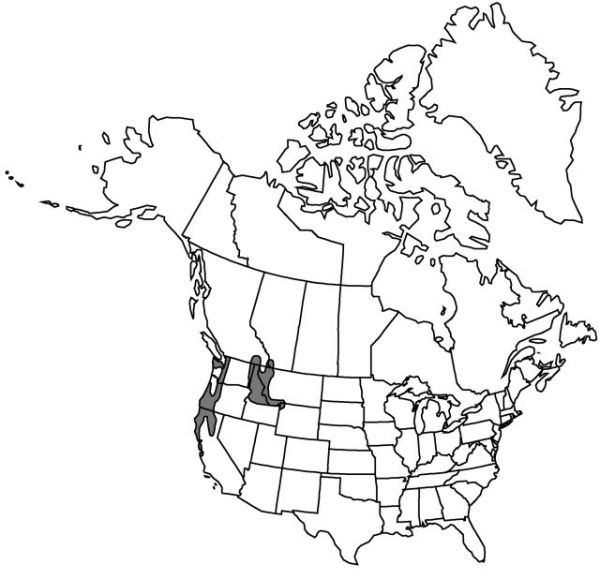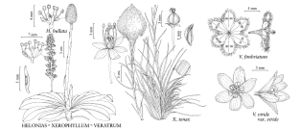Difference between revisions of "Xerophyllum tenax"
Gen. N. Amer. Pl. 1: 235. 1818.
Common names: Bear-grass squaw-grass elk-grass Indian-basket-grass
Basionym: Helonias tenax Pursh
Synonyms: Xerophyllum douglasii S. Watson
FNA>Volume Importer |
FNA>Volume Importer |
||
| Line 30: | Line 30: | ||
|elevation=0–2300 m | |elevation=0–2300 m | ||
|distribution=Alta.;B.C.;Calif.;Idaho;Mont.;Oreg.;Wash.;Wyo. | |distribution=Alta.;B.C.;Calif.;Idaho;Mont.;Oreg.;Wash.;Wyo. | ||
| − | |discussion=<p>Xerophyllum tenax, variable in plant and flower size, is without evident geographic races (S. M. Maule 1959). Similar in most respects to X. asphodeloides but more robust, X. tenax typically has twice the number of flowers (F. H. Utech 1978c). The leaf fibers were used by native tribes for garments and decorative, watertight baskets. The bulbous rhizomes were roasted for several days before being eaten.</p> | + | |discussion=<p><i>Xerophyllum tenax</i>, variable in plant and flower size, is without evident geographic races (S. M. Maule 1959). Similar in most respects to <i>X. asphodeloides</i> but more robust, <i>X. tenax</i> typically has twice the number of flowers (F. H. Utech 1978c). The leaf fibers were used by native tribes for garments and decorative, watertight baskets. The bulbous rhizomes were roasted for several days before being eaten.</p> |
|tables= | |tables= | ||
|references={{Treatment/Reference | |references={{Treatment/Reference | ||
| Line 57: | Line 57: | ||
|publication year=1818 | |publication year=1818 | ||
|special status= | |special status= | ||
| − | |source xml=https://jpend@bitbucket.org/aafc-mbb/fna-data-curation.git/src/ | + | |source xml=https://jpend@bitbucket.org/aafc-mbb/fna-data-curation.git/src/8f726806613d60c220dc4493de13607dd3150896/coarse_grained_fna_xml/V26/V26_51.xml |
|genus=Xerophyllum | |genus=Xerophyllum | ||
|species=Xerophyllum tenax | |species=Xerophyllum tenax | ||
Revision as of 16:45, 18 September 2019
Stems (0.8–)1.2–1.8(–2) m. Leaf blade 2–8(–10) dm × 2–4(–6) mm. Racemes 5–7 dm. Tepals oblong to lanceolate, 6–9 × 2–3 mm; styles 4 mm. Capsules 5–7 mm. Seeds 4 per locule. 2n = 30.
Phenology: Flowering spring–early summer.
Habitat: Open coniferous woods, dry ridges, rocky slopes, and clearings
Elevation: 0–2300 m
Distribution

Alta., B.C., Calif., Idaho, Mont., Oreg., Wash., Wyo.
Discussion
Xerophyllum tenax, variable in plant and flower size, is without evident geographic races (S. M. Maule 1959). Similar in most respects to X. asphodeloides but more robust, X. tenax typically has twice the number of flowers (F. H. Utech 1978c). The leaf fibers were used by native tribes for garments and decorative, watertight baskets. The bulbous rhizomes were roasted for several days before being eaten.
Selected References
Lower Taxa
None.
